
The American tax system may finally get dragged into the modern world, with an assist from a federal contractor based in Tysons.
Maximus has signed an agreement with the Internal Revenue Service to participate in a $2.6 billion push to modernize the agency’s computer systems and databases, the government services company announced yesterday.
Under the seven-year contract, Maximus will compete with other awarded companies to upgrade technology dating back to the 1960s, consolidating over 400 different systems into “a new, cloud-based architecture,” according to a public relations representative for the company.
Other awardees include Booz Allen Hamilton, which is also headquartered in Tysons.
“The IRS laid out an ambitious plan to transform how the agency provides services and capabilities to improve the taxpayer experience as well as IRS internal operations,” Maximus Federal General Manager Teresa Weipert said in the press release. “Maximus, through our excellent IRS team and modernization expertise, will deliver on that plan and taxpayer experience.”
The announcement came a day after the IRS filed a report in Congress outlining plans to test its own free electronic filing system as an alternative to paid services like TurboTax and H&R Block, which have lobbied against taxpayers submitting their returns directly to the federal government.
The IRS currently has a list of private companies that offer free tax preparation and filing services to people under certain income thresholds, but less than 3% of taxpayers utilize the “Free File” providers, even though about 70% of people are eligible, according to the Government Accountability Office.
A pilot program is expected to launch by the beginning of the 2024 tax season in January, making the IRS system available to “a small group of taxpayers,” the Washington Post reported earlier this week.
Maximus won’t be directly involved in developing the e-filing system, but its work to modernize the IRS’ technology will help “enable offerings like that,” the company spokesperson said.
Headquartered at 1600 Tysons Blvd, Maximus has worked with the IRS for more than three decades, per the press release. Its other government clients include the Social Security Administration and the Centers for Medicare and Medicaid Services.
The company has faced protests and strikes by workers in its Medicare and Medicaid call centers over their wages, benefits and working conditions. A coalition of labor and civil rights groups sent a letter to the Labor Department in March calling for an investigation into allegations of racism and sexism.
Low pay, unaffordable health care costs, inadequate break and paid leave policies, and other issues persist in Maximus call centers, according to the Communications Workers of America, the union that has been organizing some employees.
“Workers have raised serious questions about racial disparities at Maximus, particularly for Black and Latina women who feel that they have no clear paths to career advancement,” CWA organizer Victoria Miller said. “The IRS itself is a model of equity in comparison to the vast racial and gender disparities that exist at Maximus.”
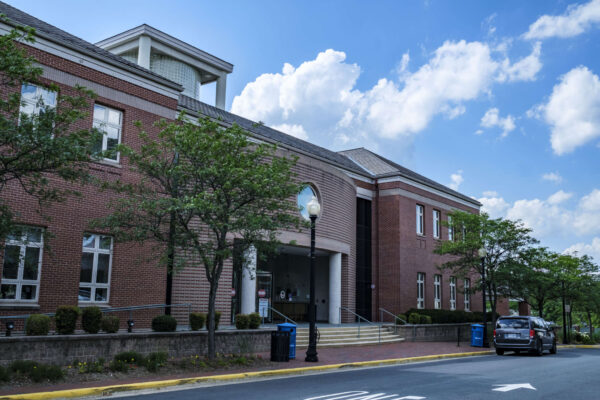
(Updated at 3 p.m.) The Herndon Town Council voted unanimously this week to reduce the town’s real estate tax rate for the first time in more than a decade.
At a meeting on Tuesday (May 9), the council approved a decrease of the rate from $0.265 per $100 of assessed real estate property value to $0.260 per $100 of assessed value.
“This council’s vote to lower the tax rate is acknowledgement of the higher cost of living many of our citizens are experiencing,” Mayor Sheila Olem said. “Real estate assessments are up. The cost of groceries, utilities, gas — all are up. Our aim in adopting this tax rate decrease is to offer some relief to our citizens in these economic times.”
The half-cent cut is a change from the proposed fiscal year 2024 budget submitted last month by Town Manager Bill Ashton II, who suggested keeping the tax rate flat.
But under the newly adopted budget, water and sewer rates will increase by roughly 1.5% due to higher treatment and commodity costs, according to the town.
The town is also positioning itself to absorb the town’s rising contribution to capital costs associated with water sewer treatment. Other taxes and fees remain unchanged.
Overall, the $62.2 million package represents an 8.6% spending increase over last year.
It also includes market rate adjustments (MRA) to boost employee salaries, particularly for sworn officers of the Herndon Police Department.
“The council’s adopted budget also authorizes a significant market rate adjustment for sworn officers of the Herndon Police Department, giving the town parity among nearby jurisdictions, all of which are competing for qualified law enforcement candidates,” the town said.
According to a town spokesperson, the details for the police MRA increase “are not final,” but non-sworn town employees will get a 1% bump this July, followed by a 2% increase in January 2024.
The adopted budget will be available online by July 1, when the new fiscal year begins.
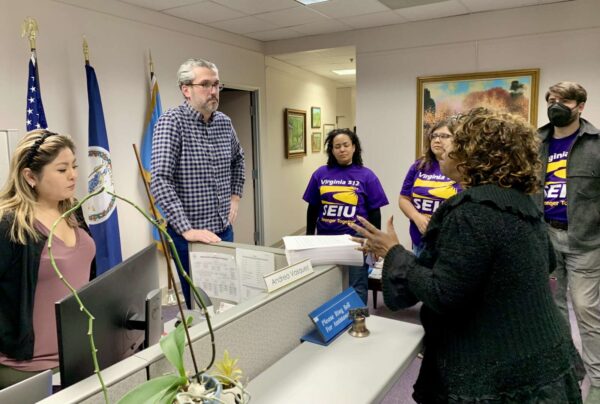
With over $110 million in unallocated funds to work with, the Fairfax County Board of Supervisors moved yesterday (Tuesday) to address employee compensation, tax relief and other priorities.
As approved by the board 9-1, nearly all of that available money will go toward reducing the real estate tax rate by 1.5 cents and fully funding salary market rate adjustments for county employees — items totaling $47 million and $54.9 million, respectively.
Other revisions to the county’s advertised budget for fiscal year 2024 include support for bamboo removal on park land, additional staffing for the 24-hour domestic violence hotline, and the creation of a self-help legal center in the Fairfax County Courthouse.
“The adjustments I’ve outlined here show a true balance between tax relief, investing in county employees, standing up and fighting for our school system, and also making sure that the core services that have made this county…are supported in this budget,” Board of Supervisors Chairman Jeff McKay said when introducing the mark-up package.
The budget proposal that County Executive Bryan Hill presented in February kept the county’s real estate tax rate flat at $1.11 per $100 of assessed value, but with the average residential bill calculated to increase by about $520, board members indicated that they would look for ways to cut the rate.
With yesterday’s vote, the board agreed to adopt a rate of $1.095 per $100 of value, which will lower the average increase to $412.
Herrity proposes cuts to schools budget
Several supervisors expressed disappointment at not being able to make a bigger cut. Mason District Supervisor Penny Gross stated she had hoped for a 3-cent reduction, and Springfield District Supervisor Pat Herrity proposed an “alternative” budget that he said would take five cents off.
The reduction would’ve been achieved by cutting $100 million from the county’s funding for Fairfax County Public Schools and putting $31 million for affordable housing on hold, among other cuts, according to a plan Herrity shared at a pre-mark-up session on Friday (April 28).
After FCPS told the board in a memo that Herrity’s proposal would “most definitely” prevent the school system from fully covering worker salary increases, he revised the proposal yesterday to suggest cutting $31 million from schools, taking one additional cent off the tax rate.
“I’m all for giving schools all the resources they need to address the challenges of the pandemic and challenges of our kids, but the spending needs to be done in a responsible way,” Herrity said.
Other supervisors blasted Herrity’s proposal as “budgeting by ambush” and “completely out-of-touch.” McKay noted that any reduction in salary increases for teachers would mean losing state money contingent on average raises of at least 2.5% for instructional positions in FY 2024, which begins July 1.
“The Herrity budget proposal doesn’t cut waste,” Braddock District Supervisor James Walkinshaw said. “I think you were trying to find waste. Instead of waste, you found teacher salaries and textbooks. It’s not cutting fat from the FCPS budget, it’s cutting into the bone.”
Support for FCPS constitutes 52% of Hill’s proposed $5.1 billion budget, which includes a $144 million increase for the school system compared to last year. Read More
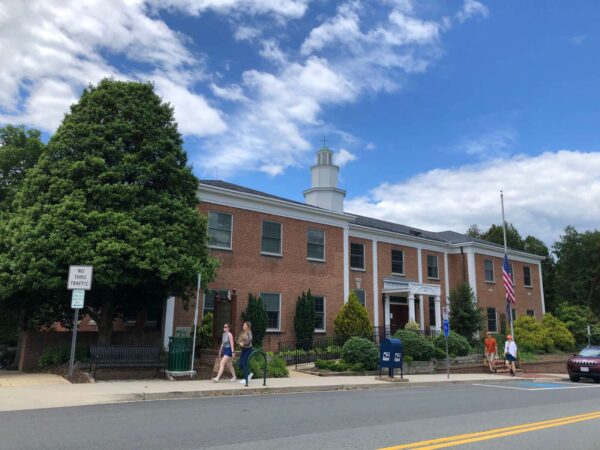
The Town of Vienna will reduce its real estate tax rate by a full cent for the upcoming fiscal year 2024, which begins July 1.
Approved unanimously by the town council on Monday (April 24), the reduction is bigger than the quarter-cent decrease first proposed by Town Manager Mercury Payton last month, but it still won’t be enough to completely counterbalance the rising property values most homeowners experienced this year.
The new tax rate of 19.5 cents per $100 of assessed value represents the 11th consecutive year where the town has adopted a flat or reduced rate compared to the previous year, according to a press release.
“While that rate doesn’t quite equalize everyone, it does help account for the increase in assessments,” Vienna Finance Director Marion Serfass told the town council. “…As homeowners in Vienna, we’re all pleased to know our houses are increasing in value. We’re not quite so pleased to pay increased taxes on them, but this lowering of the tax rate will offset that somewhat.”
On average, real estate assessments in Vienna increased by 10% this year, Mayor Linda Colbert said in the press release.
According to Colbert, the town council asked staff to revisit their financial forecasts to see if it would be possible to “to reduce that burden on taxpayers.”
“Thanks to conservative budgeting, no increase in health insurance rates for Town staff and an increase in other revenues reported later in the budget process, the finance staff determined that Vienna could further reduce the tax rate in the proposed budget and still operate at high standards,” Colbert said.
When presenting his proposed $50.1 million budget in March, Payton said the town anticipated getting increased revenue from business licenses, meals and sales taxes and interest rates, enabling it to address inflation and employee compensation.
Though the one-cent real estate tax rate reduction won’t stop many residents from getting higher bills, it will lower the average increase while allowing the town to maintain a rainy day fund with over 18% of the next year’s budget, the town says.
“We don’t want to be in a position where we cut the tax rate too far,” Serfass said. “We’re all worried about storms on the horizon. We don’t know exactly what’s going to happen, so we’re trying to be conservative.”
The proposed budget, which adds one staff position each in the public works and planning departments, is scheduled to go before the town council for a final vote on May 15.
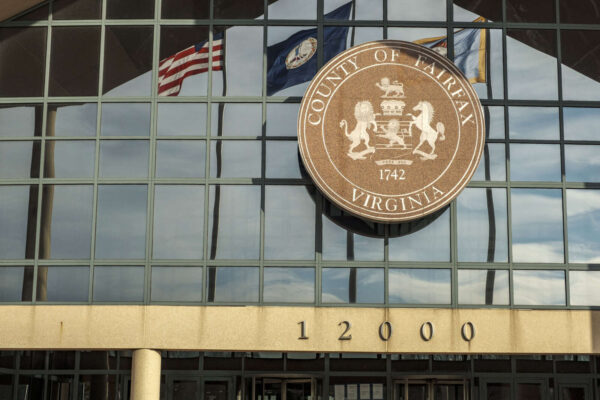
Fairfax County is currently set to keep its real estate tax rate the same as last year, but some local residents accused county leadership of trying to disguise a tax hike for local residents.
During a meeting on Tuesday (April 11), the Board of Supervisors held a public hearing for the fiscal year 2024 tax rate, which is likely to hold steady at $1.11 per $100 of assessed value.
The staff report notes, however, that holding the tax rate steady is effectively an increase in the tax bill for most residents. According to the report:
It should be noted that the total increase in assessed value of existing properties is expected to be 5.68 percent, including an increase of 6.97 percent for residential real property and an increase of 1.65 percent for non-residential real property. As a result, most property owners would experience an increase in their real estate tax bill even if the tax rate remains unchanged.
The tax rate drew the ire of some locals in the public comments, who said the relatively low attendance at the meeting was another sign that the public didn’t fully understand what the tax rate would mean for their bills.
“In his March 7 email, the Chairman said the advertised rate of $1.11 is unchanged from last year,” said Arthur Purves, president of the Fairfax County Taxpayers’ Alliance. “That statement is in violation of the Virginia Code, which states that previous years’ rate must be lowered to offset an increase in assessments.”
He claimed that the rate should be lowered to $1.05 and accused the County leadership of underhanded dealing when it came to the tax rate.
“A good rule of thumb for homeowners is that when supervisors say they are reducing the tax rate, expect a tax hike,” Purves said. “This is because the Supervisors only reduce the rate when there is an assessment increase and the rate is never reduced enough to offset the assessment increase.”
Purves said that, even as someone aware of the ins and outs of the budget process, it was still frustratingly difficult to find out when the public hearing on the proposed tax rate was being held. Others said they had similar challenges finding out when the budget hearings would be held.
“These taxes are a significant financial burden for businesses and homeowners alike,” said Justin Mastrangelo. “While I understand what you’re trying to do behind the increase, it can be difficult for many of us to absorb the cost.”
Board of Supervisors Chairman Jeff McKay previously called the budget forecast a “real mixed bag” and indicated to FFXnow that he would support a reduction in the tax rate, though the board hasn’t signaled how much of a drop is under consideration.
Others at the public hearing noted that inflation and changing real estate markets would, as Mastrangelo said, put much of the costs onto county residents.
The tax rate is open to feedback until May 2, 2023. The Board of Supervisors is scheduled to vote and adopt the FY 2024 budget on May 9.
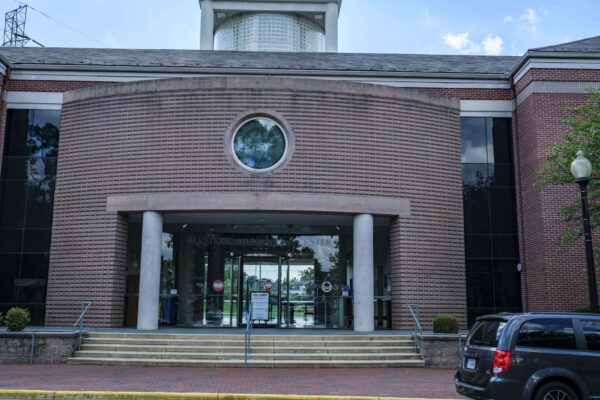
No property tax rate increases are proposed in the Town of Herndon’s budget proposal for fiscal year 2024.
The $62.5 million budget, submitted by town manager Bill Ashton II, represents a 9% increase over last year’s budget.
Ashton said the town was able to hold the line on its real estate tax rate despite the pressures of inflation and a tight labor market.
“Nevertheless, and through careful fiscal management, the proposed FY 2024 Budget allows for continuation of the programs and services town citizens expect and enjoy, as well as funding for new initiatives, chief among them preparatory work on the town’s Comprehensive Plan,” Ashton said in a news release.
But he cautioned that a mixed level of continued recovery is forecasted in the current economic environment.
“With significant levels of inflation, rising interest rates, and a looming national economic recession, the extent to which these pressures will affect the town’s revenue projections is unknown,” Ashton wrote in a letter with his budget proposal. “While we experienced significant revenue declines during the pandemic, we saw many revenue categories start to recover last year.”
Higher tax bills are expected still for most property owners because of rising real estate values. The real estate tax rate will still remain the same at 26.5 cents per $100 of assessed value.
But increases are proposed for water and sewer rates. The sewer service rate will go from $7.16 to $8.28 per 1,000 gallons of water consumption, and the water service rate will increase from $3.31 to $3.47 per 1,000 gallons of water consumption.
All water consumed during peak periods behind the average in the preceding two winter-quarter billing periods will be charged at a higher rate: $5.91 per 1,000 gallons.
The town also plans to use remaining funding from the American Rescue Plan Act to complete deferred maintenance projects, vehicle purchases and water-sewer infrastructure projects.
The Herndon Town Council will adopt the proposed budget on June 30 following a series of public hearings and work sessions.
The public hearings are slated for Tuesday, April 11 and Tuesday, April 25 at 7 p.m. in the Ingram Council Chambers.
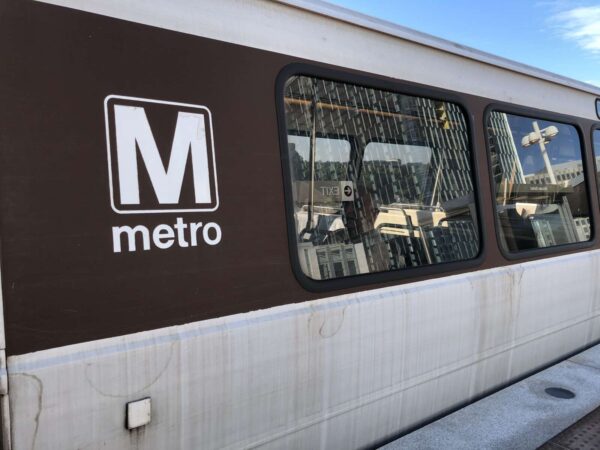
The final touches on the first phase of the Silver Line project that brought Metro into Tysons are falling into place, almost a decade after the five new rail stations in Fairfax County opened.
Construction on the shoulder of the Dulles Connector Road — which links the Dulles Toll Road in Tysons to the I-66 interchange in Idylwood — has been completed, according to a presentation that the Fairfax County Department of Transportation gave to the Board of Supervisors’ Phase 1 Dulles Rail Transportation Improvement District Commission on Tuesday (March 28).
The shoulder reconstruction, which began in April 2022, and some manhole repairs were the last “outstanding” items in the Dulles Corridor Metrorail Project’s first phase, FCDOT Special Projects Division Chief Martha Coello told the commission.
Some lane closures were in place this week for the shoulder construction. A spokesperson for Metropolitan Washington Airports Authority didn’t respond by press time on whether that was the last round of closures.
With a total cost of $2.98 billion, the first phase expanded Metro to Tysons and Reston, launching passenger service in July 2014.
To continue paying off debt from the project, the commission approved a flat tax rate of nine cents per $100 of assessed value for commercial and industrial properties in the special tax district created to fund the Silver Line.
Fairfax County Department of Management and Budget Deputy Director Joe LaHait recommended continuing the current tax rate into fiscal year 2024, which begins July 1, “since coverage in the prior fiscal year (FY2022) cannot be maintained at or above the 1.4x threshold,” an advisory board reported to the commission.
The tax district’s policy, adopted in 2013, dictates that the tax rate should be set at a level that would cover 1.4 times the amount of debt owed each year. The rate can be lowered by up to two cents if that level of coverage has been maintained for two consecutive years.
Though coverage is projected to exceed 1.4 in 2023 and 2024, it dipped below that target to 1.36 for the first time ever last year, according to county staff.
Since it took effect in 2005, the Phase 1 tax district has generated approximately $428.5 million, including $15.5 million in the current fiscal year 2023, as of February — enough to cover the $400 million that Fairfax County was tasked with giving to the MWAA for the project.
“All debt has been issued for this tax district and reached the $400 million cap paid to the Airports Authority,” the advisory board’s minutes from its March 15 meeting said. “The funds were collected via cash contribution and bonds.”
With the county’s obligation covered, the tax district revenue will now be used to pay off debts. As of June 30, it had about $125 million in outstanding debt.
At its Tuesday meeting, the commission also approved a tax rate of 18 cents per $100 of assessed value for the special tax district for the Silver Line’s second phase, which extended Metro from Reston to Ashburn in Loudoun County.
The approved rate represents a two-cent reduction from the current fiscal year 2023 rate, which staff said in March 2022 couldn’t be lowered.
Per a staff presentation, the Dulles Airport and Ashburn stations remain the busiest of the new stations since they opened in November. New Fairfax Connector bus routes supporting the stations in Reston and Herndon are carrying 579 passenger trips per day.
The tax rates for both the Phase 1 and Phase 2 districts will be formally adopted when the Fairfax County Board of Supervisors approves a budget for FY 2024 on May 9.

Fairfax County could be putting a little more money into a program that aims to make paying taxes in the county easier.
At a budget committee meeting on Tuesday (March 28), the Board of Supervisors got a briefing on the fiscal year 2023 third quarter review, looking over how staff are proposing to use a net $51.2 million in available funding.
Most of that new funding comes from interest rate increases by the Federal Reserve to rein in inflation. That resulted in an additional $37.58 million for the county, which also saw an increase of $11.23 million in revenue from personal property taxes.
The lion’s share of that funding is going to capital projects, like courtroom renovations, but county staff have proposed using $18.96 million for information technology (IT) improvements that could, in part, go into effect by the end of the year.
The one most residents will likely notice is an upgrade to the county’s tax payment systems. While a precise timeline for what will be a multi-year overhaul is still being worked out, staff said the $4 million proposed in the FY 2023 third quarter review would give the program a substantial boost.
“This gives us a good downpayment to get the work started,” said Jay Doshi, director of the Department of Tax Administration. “[The IT Department] has been not only partnering with us, but reaching out to vendors who will offer services to get us to where we’d like to be.”
IT staff said the plan is to have some improvements in place by this fall for residents filing property taxes.
“We’ve relied for a long time on people mailing in checks, paying an exorbitant fee with their credit card, or standing right outside this hallway,” Board of Supervisors Chairman Jeff McKay said. “I think this is a short-term improvement but will have long-term benefits…I’m glad to hear at least the beginning parts to this, some of the pieces our citizens will experience, will be forthcoming as soon as this fall.”
Other notable allocations in the third-quarter review include $400,000 to help the Fairfax County Park Authority clear running bamboo, $4.1 million to cover increased overtime costs for Fire and Rescue personnel, and a total of $1.75 million for road and parks signage related to the Route 29 and 50 renamings.
The removal of the names Lee Highway and Lee-Jackson Memorial Highway has to be voted on by the Commonwealth Transportation Board, which has the authority to name state roads, Fairfax County Department of Transportation spokesperson Robin Geiger confirmed.
The board met earlier this week, but the topic wasn’t on its agenda.
“The allocation of funds is in preparation of the approval of the name changes,” Geiger said.

The Town of Vienna intends to lower its real estate tax rate for a third consecutive year, as home values continue to soar.
Released on Monday (March 6), the town’s proposed budget for fiscal year 2023-2024 — which will begin on July 1 — cuts the real estate tax rate by a quarter of a cent, decreasing it to 20 cents per $100 of a property’s assessed value.
If the proposal is approved, the town will have reduced its property tax rate by 2.25 cents — or 11% — during the pandemic. Cuts were also approved last year and in 2021, which had represented the first rate decrease since 2013.
Even with the quarter-cent rate reduction, however, Vienna homeowners should brace for a big jump in their tax bills.
“The average residential tax bill is estimated at $2,041, an 8.6 percent increase over last year, due to a 10.0 percent increase in assessed value of existing…properties,” Town Manager Mercury Payton said in his budget proposal. “The increase in commercial and residential assessments generates a revenue increase of $884,000 after the real estate tax rate reduction.”
Calculated annually by Fairfax County, this year’s real estate assessments found that the average value of residential properties in Vienna is now slightly over $1 million, with the biggest group falling in the $500,000 to $800,000 range. Residential properties valued at over $1 million, including a few that exceeded $3 million, make up 29.9% of the town’s properties.
With increased revenue also reported from business licenses and the meals and sales taxes, the proposed budget totals $50.1 million — an increase of $1.4 million or 2.9% from the current budget.
Those funds will be used to increase compensation for town employees by 5%, with sworn public safety workers getting an additional 0.5% step increase. The increases are partly intended to assist with rising costs due to inflation, which hit a 40-year high last fiscal year.
Payton has also proposed continuing to offer a $2,000 signing bonus to commercial licensed drivers, an incentive introduced last year to address staffing shortages in the public works department.
“The program is budgeted at $65,000 in the general fund, and has already had a positive impact in recruiting and retaining qualified drivers,” Payton wrote.
The budget adds two full-time staff positions: a senior compliance officer in planning and zoning, and a civil and capital project engineer, who will help manage infrastructure and sidewalk projects while also reviewing single-family housing and commercial redevelopment applications.
To cover some of the salary increases and increased water purchase and sewer treatment costs, the budget proposes increasing water and sewer rates by 10%, raising service charges for residents from $32.80 per quarter to $35.00 per quarter.
The average customer’s bill would go up by $20.25 per quarter, or $80 a year.
“This proposed budget is based on direction from the Town Council early in the process and recommendations from the staff budget committee over the course of the last few months,” Payton said in a news release. “The result is a legally balanced proposed budget that addresses priority operational concerns, and provides continued support for day-to-day operations in all Town departments.”
The Vienna Town Council will discuss the proposed budget in conference sessions on Saturday (March 11) and Monday (March 13) before advertising the package, including tax rates, on March 23. Public hearings are set for April 10 and 24, with a final vote coming on May 15.
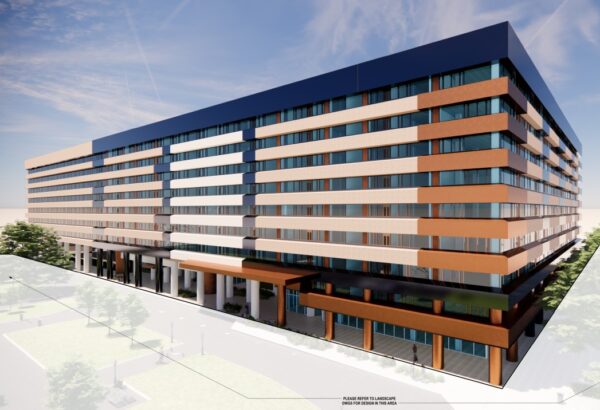
The redevelopment of two empty commercial buildings in the Bailey’s Crossroads areas has been approved — along with a nearly $14 million partial tax break from Fairfax County.
At a meeting on Tuesday (Feb. 21), the Fairfax County Board of Supervisors unanimously approved funds for the Skyline project through the county’s Economic Incentive Program, which allows qualifying properties to receive funds in the county’s five Commercial Revitalization Districts (CRDs).
Other CRDs are located in Annandale, McLean, Richmond Highway and Springfield, along with the revitalization area of Lincolnia. The program was designed to provide financial incentives to the private sector on projects that rely on assembling and developing properties.
The project would connect the long-vacant duo of office buildings (5113 and 5111 Leesburg Pike) into up to 510 live-and-work units, ranging from 600 to 1,300 square feet in size.
In a memo, county staff said that the project provides “crucial” affordable housing for families earning from 60 to 80% of the area median income.
Mason District Supervisor Penny Gross said the repurposing of the buildings is an important step to revitalize the area.
“Vacant office buildings don’t enhance community but work-life communities revitalize our community,” she said.
The buildings currently have nine office floors and a penthouse level on top of a three-story parking garage. The connecting building at 5109 Leesburg Pike would remain standing as commercial space.
The shift comes after Skyline buildings one through three received county approval in July and September 2020 for a similar repurposing of office space to up to 720 “live/work” units.
Board of Supervisors Chairman Jeff McKay called the proposal an “excellent” and “creative” use of funds in an area of the county that needs additional support.

